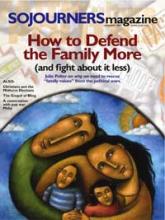In the waning days of the 2006 election campaign, it appeared that being pro-family was the most important aspect of our democratic process: Grand statements were made “in defense of marriage,” or at least in defense of a concept of marriage. Pro-family candidates—and what candidate isn’t pro-family?—from both parties displayed their nuclear families (who, fittingly, almost always wore smiles that were nearly radioactive) in TV ads that were short on policy content but assured voters that candidates do not apparently eat their young. Soon, we were assured, taxes would be cut, services increased, and schools improved—all to support families, of course. And with the elections over, the vulnerable youth of our country will be safe from culture-coarsening campaign ads for perhaps a year. If we’re lucky.
James Dobson is pro-family; my neighbor with the Pro-Child, Pro-Family, Pro-Choice bumper sticker is pro-family. Under some definitions, Tony Soprano is pro-family. A cynic might assume that someone is lying about their support for families, or that people are pulling the phrase from different dictionaries, possibly from different planets. Of course, deep-seated differences of understanding about who constitutes a family and the proper roles within it do drive the most divisive “pro-family” rhetoric. Political maneuvering and pandering then exploits those philosophical differences, often using “support for families” as a bait and switch to promote policies that arguably have little or nothing to do with the real daily struggles and joys of real families.
Read the Full Article

